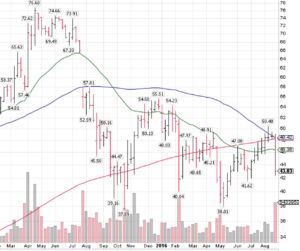
(Editor Note: August 29, 2016 – Mylan executives announced they would introduce a generic version of the two Epipen product for $300. This move is a step in the right direction, but not nearly enough, the two pack was priced at $100 in 2007. So, this price move is a 300 % increase instead of 578 %, just not enough. Particularly, when inflation has been on average 1.4 % since 2007, or 11.2 %. Our view is Mylan still needs to end stock buy backs in the amount of $1 billion, lower extremely high executive pay based on stock performance, plus, drugs like the Epipen which are life saving should be categorized as ‘patient critical’. )
The View:
Mylan’s executives have raised the price of two Epipens, used to counteract allergic reactions, over 578 % since 2007. They made this move because soon a generic alternative was coming on the market from Teva – however the FDA found deficiencies in their product. So, Mylan has a virtual monopoly. This gives them extreme pricing power to drive profits for the firm. While, Mylan has been raising prices, for the last year they have been buying back stock – authorized up to $1 billion over the last year. Stock buybacks are employed by companies to take stock off the open market, to try to move the stock price up – these funds are not invested in product innovation, worker salaries, or cost reduction. Mylan’s executives have highly leveraged stock compensation plans, so stock buybacks can put money in their pocket – taking dollars from patients and parents who critically need the Epipen. Epipen sales are estimated to be $1.7 billion per year, so $1 billion in stock buyback funds would go a long way to reduce the price of Epipens! While Mylan has spent these funds over the last year ending Aug 27 of this year, they have been issuing corporate bonds for hundreds of millions of dollars. Instead of using debt funds for stock buybacks they could be used to reduce the price of Epipens. While, Mylan says they offer coupons to those with insurance and out of pocket copays it is not nearly enough – they still have not reduced the price of the product. By keeping the product price high they maintain their revenue stream via the drug insurers. Those families without insurance, are paying $608 for two Epipens, the full retail price. This is an example of a indirect income transfer from the poor and middle class who can’t afford these sky high prices to the top 1 % in executive ranks. The Action:
- End Stock Buy Backs – corporations are using stock buybacks to manipulate and control their stock price without immediate disclosure. Support Senator Tammy Baldwin’s request for disclosure and enforcement of existing laws and write to the SEC.
- Sign the MoveOn.org Petition – they are collecting signatures to be sent to Mylan CEO Heather Bresch
- Convince university and foundation endowment administrators to sell their holdings in Mylan shares until the firm ends stock buybacks and reduces the price of the Epipen product.
- Establish a list of ‘patient critical’ drugs, monitor their price, when it moves too high, release PR campaigns directed at the offending firms and demand price reductions (along with stock buybacks that are taking money right out of patient pockets).
The Story:
Mylan management employed a standard industry practice (which is debatable ethically) to raises prices of a drug just before the drug goes off patent and a generic competitor emerges. The firm can milk this income stream before losing market share and price position. In this case, the executive team went way to far raising prices on a product that is critical for patient health. Most schools require that parents provide an Epipen for a student who may suffer a major allergenic reaction, thus creating critical demand for the drug.
Does Mylan have the ability to reduce the price by up to 50 %? Yes! a year ago Mylan’s board approved the buyback of Mylan stock in the open market up to $1 billion! That $1 billion would go a long way toward reducing the price of the product to all patients. Stock buybacks are used by corporations to drive their stock price up by reducing the number of shares to investors in the open market. By moving the stock price up, they will increase the value of the shares they hold thereby increasing their compensation. Mylan’s stock price hit a high of 76 dollars the summer of 2015, then concerns about the Epipen and other issues saw the stock price fall – which is why the board authorized the stock buy back for one year ending Aug 27 2016 (to make the chart large right click on the image, the bars below price are stock volume for the week):

Mylan executives receive the majority of their compensation from stock performance of shares they hold and options on additional shares. Notice that the stock did move up some last year, but intelligent investors are beginning to question the viability of stock buybacks as they do nothing for the viability of the company in the future. There is no investment in worker salaries, worker development and education, research and development or systems to reduce costs. Please see my blog on Stock Buy Backs Spike Executive Pay for more background and details on this unethical practice.
Mylan says they are helping out with costs – but are they really? while Mylan says they will help with coupons for out of pocket expenses or copays that is fine. Except, there are many patients and parents of children who need two pens (home and school) who do not have drug insurance and many others with high deductibles which Mylan’s offer does not cover. Often arrangements between insurers and drug companies are setup where they negotiate the price lower than the list retail (ie two pens for $608), lowering the cost to the insurance firm, but giving the drug company an ongoing revenue stream and access to more patients. When Mylan picks up the out of pocket expense it is in effect it is subsidizing Epipen’s high price. Of course, the high prices fall hardest on those with no insurance who pay the full retail price.
Is our federal government indirectly supporting these actions by Mylan executives? Yes! Federal government policies and tax laws contribute to this unacceptable corporate executive behavior. Corporations receive income tax deductions for corporate executive performance compensation (stock) above $1 million, During the Clinton administration in 1993 this tax provision was approved – in effect subsidizing these exorbitant executive compensation plans when companies are not paying their fair share of taxes, leaving us to pick up the tab.
In addition, Mylan, has purchased the development assets of Abbott Labs overseas and this is able to use a tax inversion (allowing favorable tax treatment for operations in lower tax countries) to move their tax rate on these operations from 25 – 35% to 12 – 15%. It seems if they enjoy this tax break the dollars saved in taxes could go to reducing the price of the drug.
The firm has employed financial engineering to dress up the balance sheet as well. By using highly leveraged corporate debt used for stock buybacks (they have billions of dollars in debt offerings) these borrowed funds were used to perform the stock buybacks and possible future acquisitions. Instead of using the proceeds of these corporate debt offerings to finance stock buybacks, this money could be used to reduce the price of Epipens.
The Action:
It’s time to take action –
- End Stock Buy Backs – corporations are using stock buybacks to manipulate and control their stock price without disclosure. Support Senator Tammy Baldwin’s request for disclosure and enforcement of existing laws and write to the SEC.
- Sign the MoveOn.org Petition – they are collecting signatures to be sent to Mylan CEO Heather Bresch
- Convince university and foundation endowment administrators to sell their holdings in Mylan shares until the firm ends stock buybacks and reduces the price of the Epipen product.
- Establish a list of ‘patient critical’ drugs, monitor their price, when it moves too high, release PR campaigns directed at the offending firms and demand price reductions (along with stock buybacks that are taking money right out of patient pockets).
- Write to your senator or congressman to end corporate income tax deductions for executive performance compensation above $1 million, and the foreign tax escape of corporate inversions.
